-
REVIEW01-01-2015
Adverse events and safety in nursing care
Revista Brasileira de Enfermagem. 2015;68(1):144-154
Abstract
REVIEWAdverse events and safety in nursing care
Revista Brasileira de Enfermagem. 2015;68(1):144-154
DOI 10.1590/0034-7167.2015680120i
Views0See moreObjective:
to identify the scientific publications about adverse events in nursing care in adult hospitalized patients and discuss the main adverse events in nursing care.
Method:
Integrative revision with a qualitative approach. The data were collected at LILACS, MEDLINE, BDENF and the library SCIELO and were submitted to thematic analysis.
Results:
three categories were developed: Adverse events in nursing care; The main causes of the adverse events in nursing care; Attitude of nursing professionals in face of errors. The main events were identified in nursing care with emphasis on the medication error, the failure to perform dressings and falls of patients. The importance of instruments was emphasized for notification of adverse events in the institutions. However the fear of punishment on professionals stimulates the underreporting of events.
Conclusion:
it is important to discuss effective prevention strategies that ensure patient safety in healthcare institutions.
-
REVIEW01-01-2015
Staphylococcus aureus meticilino resistente adquirido na comunidade: um problema mundial
Revista Brasileira de Enfermagem. 2015;68(1):136-143
Abstract
REVIEWStaphylococcus aureus meticilino resistente adquirido na comunidade: um problema mundial
Revista Brasileira de Enfermagem. 2015;68(1):136-143
DOI 10.1590/0034-7167.2015680119p
Views0Objetivo:
descrever a epidemiologia dos casos de CA-MRSA no Brasil de forma a compreender sua ocorrência, fatores de risco associados e formas de manejo em relação à situação mundial.
Método:
revisão integrativa e para seleção dos estudos utilizou-se as bases de dados: Scopus, Science direct, Isi Web of Knowledge, PUBMED e BVS.
Resultados:
foram identificados dez artigos nacionais que descreveram 21 casos de CA-MRSA principalmente em crianças, adolescentes e adultos com quadro de infecção de pele e tecidos moles evoluindo para infecções graves relacionados ao clone Oceania Southwest Pacific Clone (OSPC) que resultaram em hospitalização.
Conclusão:
apesar do CA-MRSA ser considerado um micro-organismo de relevância mundial verificou-se a escassez de dados publicados sobre sua epidemiologia no Brasil, o que dificultam o delineamento da realidade do país frente ao CA-MRSA.
Keywords:Controle de InfecçõesFarmacorresistência BacterianaInfecções Comunitárias AdquiridasStaphylococcus Aureus Resistente à MeticilinaSee more -
REVIEW01-01-2015
Prevention and non-pharmacological management of pain in newborns
Revista Brasileira de Enfermagem. 2015;68(1):131-135
Abstract
REVIEWPrevention and non-pharmacological management of pain in newborns
Revista Brasileira de Enfermagem. 2015;68(1):131-135
DOI 10.1590/0034-7167.2015680118i
Views0See moreObjective:
to describe the main non-pharmacological interventions for pain relief in newborns available in Neonatal Intensive Care Unit.
Method:
an exploratory search of the MedLine, Lilacs and Scielo online databases was conducted to retrieve references of studies published from 2004 to 2013.
Results:
several non-pharmacological interventions were shown to be effective, to represent low risk for neonates and to have a low operational cost. The ones most often discussed in the literature were: oral administration of glucose/sucrose, non-nutritive sucking, breastfeeding, skin-to-skin contact, facilitated tucking and swaddling.
Conclusion:
healthcare teams should be familiar with these methods and use them more effectively in Neonatal Intensive Care Unit daily routines, so as to ensure that newborns receive qualified and more human care.
-
BANFISA e (IN)DICA-SUS na graduação em saúde: o lúdico e a construção de aprendizados
Revista Brasileira de Enfermagem. 2015;68(1):124-130
Abstract
BANFISA e (IN)DICA-SUS na graduação em saúde: o lúdico e a construção de aprendizados
Revista Brasileira de Enfermagem. 2015;68(1):124-130
DOI 10.1590/0034-7167.2015680117i
Views0See moreObjectives:
to analyze the learning built during the matches of the games by students of the subject Gestão de Políticas Públicas em Saúde at the Universidade de Brasília.
Method:
exploratory, descriptive research, in a qualitative approach, with 26 students from various graduation courses in health, using a questionnaire and participant observation.
Results:
participants reinvented rules, related issues addressed in the games to the reality, interacted with colleagues and had fun throughout the match. Comparing the games in relation to ludicity, the BANFISA was more attractive than the (IN) DICA-SUS, although they are complementary.
Conclusions:
learning constructed by the students goes beyond the content of the subject; involve the active participation in group and creativity.
-
Chinese auriculotherapy to improve quality of life of nursing team
Revista Brasileira de Enfermagem. 2015;68(1):117-123
Abstract
Chinese auriculotherapy to improve quality of life of nursing team
Revista Brasileira de Enfermagem. 2015;68(1):117-123
DOI 10.1590/0034-7167.2015680116p
Views0See moreObjective:
to evaluated the effi cacy of auriculotherapy for improving quality of life and reducing stress in nursing staff.
Method:
single-blind radomizad clinical trail envolving 175 subjects randomized in: Control (G1), Protocol Group (G2) and without Protocol Group (G3). They were evaluated by the Stress Symptoms List and SF36v2 at baseline, after 12 sessions and follow up (30 days), between January and July 2012.
Results:
both intervention groups reduced stress (p <0.05) with greater effect for G3 (d = 1.15). G3 was also higher for improving life quality especially the physical domain (p = 0.05).
Conclusion:
individualized auriculotherapy (G3) had greater effect compared to the protocol auriculotherapy (G2) for reducing stress and improving life quality.

-
Adherence to foot self-care in diabetes mellitus patients
Revista Brasileira de Enfermagem. 2015;68(1):111-116
Abstract
Adherence to foot self-care in diabetes mellitus patients
Revista Brasileira de Enfermagem. 2015;68(1):111-116
DOI 10.1590/0034-7167.2015680115p
Views0See moreObjective:
to analyze the self-care of patients with type 2 diabetes mellitus in the Family Health Strategy in Teresina-PI.
Method:
search cross selected by simple random sampling, 331 people with diabetes mellitus. Data collection took place from August to December 2012 with the use of Self-Care Activities Questionnaire with Diabetes and structured instrument for recording information socioeconomic and guidance received by the professional nurse.
Results:
the data revealed that patients have poor adherence to blood glucose monitoring, the physical exercise and foot care, but with good adherence to the medication. Only 38.7% of the sample examined the feet of fi ve to seven days a week. Statistically signifi cant association between self-care activities with their feet and orientations of nurses (p < 0,05).
Conclusion:
that there is need to raise awareness with regard to the development of skills for self-care.

-
Patients with disorders of consciousness: vital, facial and muscular responses to music or messages
Revista Brasileira de Enfermagem. 2015;68(1):102-110
Abstract
Patients with disorders of consciousness: vital, facial and muscular responses to music or messages
Revista Brasileira de Enfermagem. 2015;68(1):102-110
DOI 10.1590/0034-7167.2015680114p
Views0See morePurposes:
to compare vital signs, facial expression and basal electroneurographic signs with measures during stimuli music, message or “silence” in coma patients, vegetative status or sedated; and relating the score of Glasgow Results Scale with the intervention realized.
Method:
a Monoblind Transversal Controlled Clinical Trial to researcher. The distribution, among the three groups, was randomized (experiment with music, experiment with message or control). Two assessments (sessions) were performed with interval of 40 minutes on the same day.
Results:
most of the 76 patients were male, between 18 to 36 years old and hospitalized due to trauma. Statistically signifi cant changes were found in the variables referred to temperature, facial expression, electroneurography and Glasgow Results Scale; more frequent alterations in second session, in coma and vegetative patients, in frontal muscles and in experiment group.
Conclusions:
the facial expression and the electroneurography seem to be more trustworthy variables than vital signs to evaluate consciousness.
-
Prevalence of minor psychiatric disorders in socio-educational agents in the state of Rio Grande do Sul
Revista Brasileira de Enfermagem. 2015;68(1):93-101
Abstract
Prevalence of minor psychiatric disorders in socio-educational agents in the state of Rio Grande do Sul
Revista Brasileira de Enfermagem. 2015;68(1):93-101
DOI 10.1590/0034-7167.2015680113p
Views0See moreObjective:
to determine the prevalence and factors associated with minor psychiatric disorders (MPD) in socio-educational agents.
Method:
it is a cross-sectional study with 381 socio-educational agents the Centers for Socio-Educational Services in the State of Rio Grande do Sul, Brazil. The Brazilian versions of the Scale of Demand-control-social support at work and the Self Reporting Questionnaire-20 have been applied.
Results:
the results showed a prevalence of suspicion MPD of 50.1%. They showed to be related to suspicion of MPD : being female (55.7%), having age up to 44 years old (58.5%), no physical activity (57.4%), do not have time for leisure (75%), make use of medication (61.4%), require medical attention (56.9%) and psychological counseling (72.7%), not being satisfied with the workplace (61.7%) and need for time off from work (65.6%).
Conclusion:
the study provides important data about the mental health of agents, showing the need for the involvement of managers and of the health service of worker’s health in planning actions to promote health of these workers.
-
EDITORIAL08-19-2024
Sexual abuse, abortion and public health in Brazil: when moral judgment accentuates inequities
Revista Brasileira de Enfermagem. 2024;77:e77suppl0401
Abstract
EDITORIALSexual abuse, abortion and public health in Brazil: when moral judgment accentuates inequities
Revista Brasileira de Enfermagem. 2024;77:e77suppl0401
DOI 10.1590/0034-7167.202477suppl0401
Views0Here is an academic-political editorial that aims to call on the scientific field to reflect on the dangers of decisions regarding the right to abortion under moral rules, since there is no evidence that such a perspective translates into practices of care, protection of childhood and gender equity – elements that are so urgent and […]See more -
ORIGINAL ARTICLE08-19-2024
The use of individual tracking programs in public health: a bioethics dilemma
Revista Brasileira de Enfermagem. 2024;77:e20230041
Abstract
ORIGINAL ARTICLEThe use of individual tracking programs in public health: a bioethics dilemma
Revista Brasileira de Enfermagem. 2024;77:e20230041
DOI 10.1590/0034-7167-2023-0041
Views0See moreABSTRACT
Objective:
to understand the bioethical perspectives on mobile tracking device use.
Methods:
theoretical study based on action research, carried out with eight graduate students from a public university. A focus group was used, with a thematic content analysis methodology with a codebook structure, approved by the Research Ethics Committee.
Results:
from the analysis, there was a concern about using devices after the pandemic ended. Using or not the device, rights inherent to humans, legislation and effectiveness of methods deepen interpretations, moving participants from a personalistic conception of the topic to a vision focused on professional implications about the methods.
Final considerations:
the debate on the impact of using technological devices on health, especially those that imply restriction of rights that refer to individuals’ private life, involves a discussion of a professional nature, in addition to requirement for clear rules on the topic.
-
ORIGINAL ARTICLE08-19-2024
Bioethical issues in the family health strategy: Considerations for nursing care management
Revista Brasileira de Enfermagem. 2024;77:e20220818
Abstract
ORIGINAL ARTICLEBioethical issues in the family health strategy: Considerations for nursing care management
Revista Brasileira de Enfermagem. 2024;77:e20220818
DOI 10.1590/0034-7167-2022-0818
Views0See moreABSTRACT
Objective:
To understand the bioethical issues involved in the care management of nurses working in the Family Health Strategy.
Method:
A qualitative study was conducted through five focus groups with 36 nurses selected in the sample. Thematic content analysis was performed based on the bioethical framework, and the synthesis was presented in a conceptual map.
Results:
Bioethical issues were identified in the nursing care practice, related to both specific bioethical themes and the peculiarities of the work. Additionally, challenges and facilitators that interfere with addressing these issues were identified.
Final considerations:
Understanding the bioethical issues involved in the care management of nurses was possible with the theoretical support of different bioethical perspectives. The identified issues relate to persistent and current themes in the field of bioethics. However, some aspects intrinsic to daily practice are still imperceptible to professionals, contributing to the difficulty of discussing bioethics in this care model.

-
REVIEW07-29-2024
Telenursing in the postoperative period: a scoping review
Revista Brasileira de Enfermagem. 2024;77(3):e20240066
Abstract
REVIEWTelenursing in the postoperative period: a scoping review
Revista Brasileira de Enfermagem. 2024;77(3):e20240066
DOI 10.1590/0034-7167-2024-0066
Views0See moreABSTRACT
Objectives:
to map available evidence on telenursing use in the postoperative period and its impact on patient outcomes.
Methods:
a scoping review, conducted according to the JBI model and the PRISMA-ScR checklist. The search was carried out in the CINAHL, Embase, LILACS, PubMed, Web of Science, SciELO, Scopus and Cochrane Library databases.
Results:
twelve studies were included, published between 2011 and 2023, 66.6% of which were in developed countries. Of the positive outcomes, we highlight improved levels of disability, autonomy and quality of life, lower rates of post-operative complications, pain and reduced costs. Telephone monitoring was the most widely used modality, but there were few studies in the pediatric context and in Brazil.
Conclusions:
of the studies, 11 (91.6%) identified at least one positive outcome in telenursing use and none showed negative aspects in the postoperative period. The role of nurses in digital health needs further study.

-
ORIGINAL ARTICLE07-29-2024
Men’s perception of paternal parenthood and the promotion of child development
Revista Brasileira de Enfermagem. 2024;77(3):e20230514
Abstract
ORIGINAL ARTICLEMen’s perception of paternal parenthood and the promotion of child development
Revista Brasileira de Enfermagem. 2024;77(3):e20230514
DOI 10.1590/0034-7167-2023-0514
Views0See moreABSTRACT
Objectives:
to comprehend men’s perception of paternal parenthood while caring for infants to promote child development.
Methods:
this qualitative study adopts an exploratory approach and was conducted with undergraduate and graduate students, faculty, and staff who are fathers of infants up to 6 months old from a higher education institution, excluding fathers from mononuclear families. Data collection occurred through semi-structured interviews and was analyzed using thematic categorical analysis.
Results:
fifteen men participated in the study. From the analysis, two empirical categories emerged: “Perception of being a father: challenges and novelties” and “Promotion of child development: actions carried out by fathers”. Fathers revealed feeling unprepared, the need for emotional support, and recognized activities aimed at their children’s development.
Final Considerations:
the relevance of the paternal figure for child development is highlighted, as well as the need for public policies to encourage paternal parenthood.
-
ORIGINAL ARTICLE07-29-2024
Contribution of informal caregivers to self-care in individuals with heart failure
Revista Brasileira de Enfermagem. 2024;77(3):e20230492
Abstract
ORIGINAL ARTICLEContribution of informal caregivers to self-care in individuals with heart failure
Revista Brasileira de Enfermagem. 2024;77(3):e20230492
DOI 10.1590/0034-7167-2023-0492
Views0See moreABSTRACT
Objectives:
to evaluate the contribution of informal caregivers to the self-care of individuals with heart failure.
Methods:
a cross-sectional study was conducted with 87 caregivers from March to October 2022 in the city of João Pessoa/PB. The caregivers’ contribution was assessed using the Caregiver Contribution to Self-Care of Heart Failure Index instrument. Scores ≥ 70 points indicate adequate contribution. Data were analyzed using descriptive statistics and Spearman’s correlation.
Results:
the sample consisted of 81.6% female caregivers. Median scores obtained for the self-care contribution scales were: 63.3 for maintenance; 55.5 for management; and 66.6 for confidence. Caregivers never or rarely recommended monitoring body weight, regular physical exercise, extra use of diuretics, and fluid restriction.
Conclusions:
informal caregivers showed inadequate contribution in the areas of maintenance, management, and confidence in self-care of individuals with heart failure.
-
Reflections on theoretical framework use in nursing research
Revista Brasileira de Enfermagem. 2024;77(3):e20230486
Abstract
Reflections on theoretical framework use in nursing research
Revista Brasileira de Enfermagem. 2024;77(3):e20230486
DOI 10.1590/0034-7167-2024-0486
Views0See moreABSTRACT
Objectives:
to reflect on theoretical framework use in nursing research.
Methods:
a theoretical-reflexive study, based on concepts and constructs pertinent to using nursing theories and other sciences, considering issues of epistemology or philosophy of science.
Results:
we presented what it is and why to do nursing research and what a theoretical framework is and why to use it, in addition to some considerations regarding theoretical framework use in nursing research, essential for constructing disciplinary knowledge, which enables the materialization of researchers’ work and the presentation of propositions resulting from investigations in and for nursing as a discipline and science.
Final Considerations:
based on a reflection based on epistemological conceptions, it is possible to affirm that a theoretical framework is the core of researchers’ thinking, delimiting a problem to be investigated and, based on it, outlining methodological strategies to be followed, supporting nursing action and thinking as discipline and science.

-
REVIEW07-29-2024
Nursing diagnoses for people hospitalized with heart failure: an integrative review
Revista Brasileira de Enfermagem. 2024;77(3):e20230471
Abstract
REVIEWNursing diagnoses for people hospitalized with heart failure: an integrative review
Revista Brasileira de Enfermagem. 2024;77(3):e20230471
DOI 10.1590/0034-7167-2023-0471
Views0See moreABSTRACT
Objectives:
to identify in the literature the main nursing diagnoses according to the NANDA-I diagnostic classification for people hospitalized with heart failure.
Methods:
an integrative literature review, carried out in February 2019 and updated in July 2023, in the MEDLINE via PubMed, LILACS, SciELO and CINAHL databases. Given the use of acronym PEO, studies without a time cut in Portuguese, English and Spanish were included. Descriptive analysis was carried out to present the identified information.
Results:
analysis of 27 articles identified 24 nursing diagnoses, with emphasis on Decreased Cardiac Output, Excessive Fluid Volume, Decreased Activity Tolerance and Fatigue.
Final Considerations:
evidence can contribute to better diagnostic decisions centered on people with heart failure in search of more assertive health results and have the potential to support future studies on a possible syndromic pattern in this population.

-
ORIGINAL ARTICLE08-07-2023
Perception of Portuguese nurses: clinical supervision and quality indicators in nursing care
Revista Brasileira de Enfermagem. 2023;76(3):e20220656
Abstract
ORIGINAL ARTICLEPerception of Portuguese nurses: clinical supervision and quality indicators in nursing care
Revista Brasileira de Enfermagem. 2023;76(3):e20220656
DOI 10.1590/0034-7167-2022-0656
Views0See moreABSTRACT
Objectives:
to describe nurses’ perception of the influence of clinical supervision on improving quality indicators in nursing care.
Methods:
exploratory research with a qualitative approach, carried out with 16 nurses using the focus group. Data processing emerged from lexicographical textual analysis, resorting to Descending Hierarchical Classification and similarity analysis.
Results:
80.0% retention of 185 text segments with six-class construction. The words were represented by four graphs (supervisor, audit, care, and process); and three subgraphs (implementation, sharing and knowledge).
Final Considerations:
in the perception of nurses, supervision influences quality indicators in nursing care.
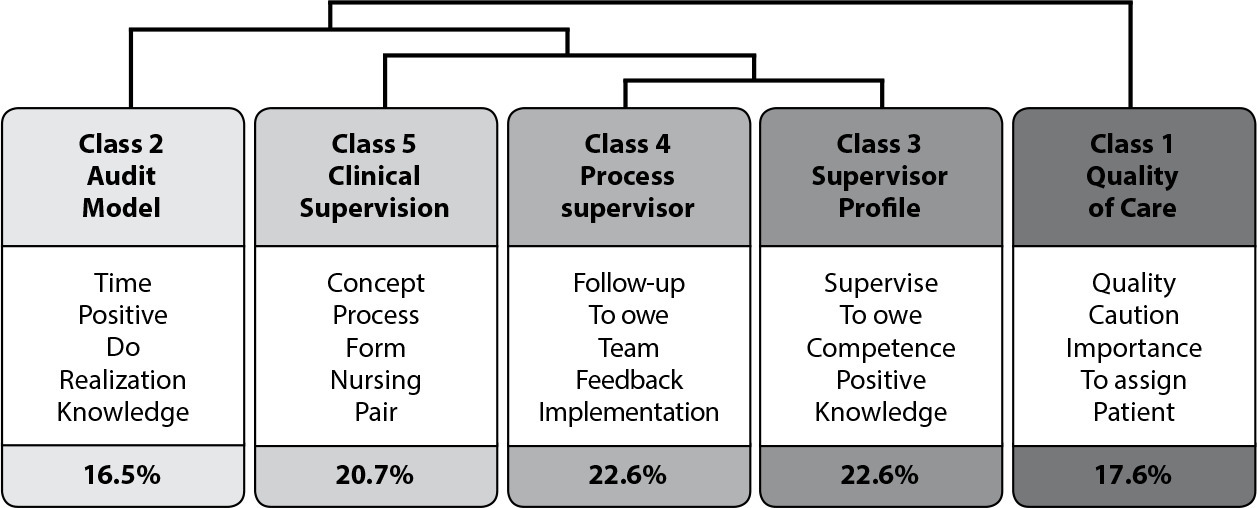
-
REVIEW08-07-2023
Early diagnosis of HIV/aids infection: concept analysis
Revista Brasileira de Enfermagem. 2023;76(3):e20220565
Abstract
REVIEWEarly diagnosis of HIV/aids infection: concept analysis
Revista Brasileira de Enfermagem. 2023;76(3):e20220565
DOI 10.1590/0034-7167-2022-0565
Views0ABSTRACT
Objectives:
to analyze the concept of “early diagnosis of HIV/Aids infection” in light of Walker and Avant’s conceptual analysis model.
Methods:
concept analysis study based on the framework proposed by Walker and Avant, instrumented by a scoping review conducted in April 2022, following the recommendations of the Joanna Briggs Institute and checklist Preferred Reporting Items for Systematic reviews and Meta-Analyses extension for Scoping Reviews. The search was made in eight data sources, obtaining sixteen articles.
Results:
the study found homosexual intercourses, early examination, anti-HIV antibodies, CD4 count, and sexually transmitted infection as the main attributes of the concept. As antecedents: information, risky behavior, unprotected sexual relations, prevention, and access to the service. As main consequences: antiretroviral treatment, seroconversion, transmission, and consultations.
Final Considerations:
the study approached the circumstantial situations of the theme, its attributes, antecedents, and consequences, qualifying the work process based on knowledge of nursing practice.
Keywords:Acquired Immunodeficiency SyndromeAIDS SerodiagnosisEarly DiagnosisHIV InfectionsHospital UnitsSee more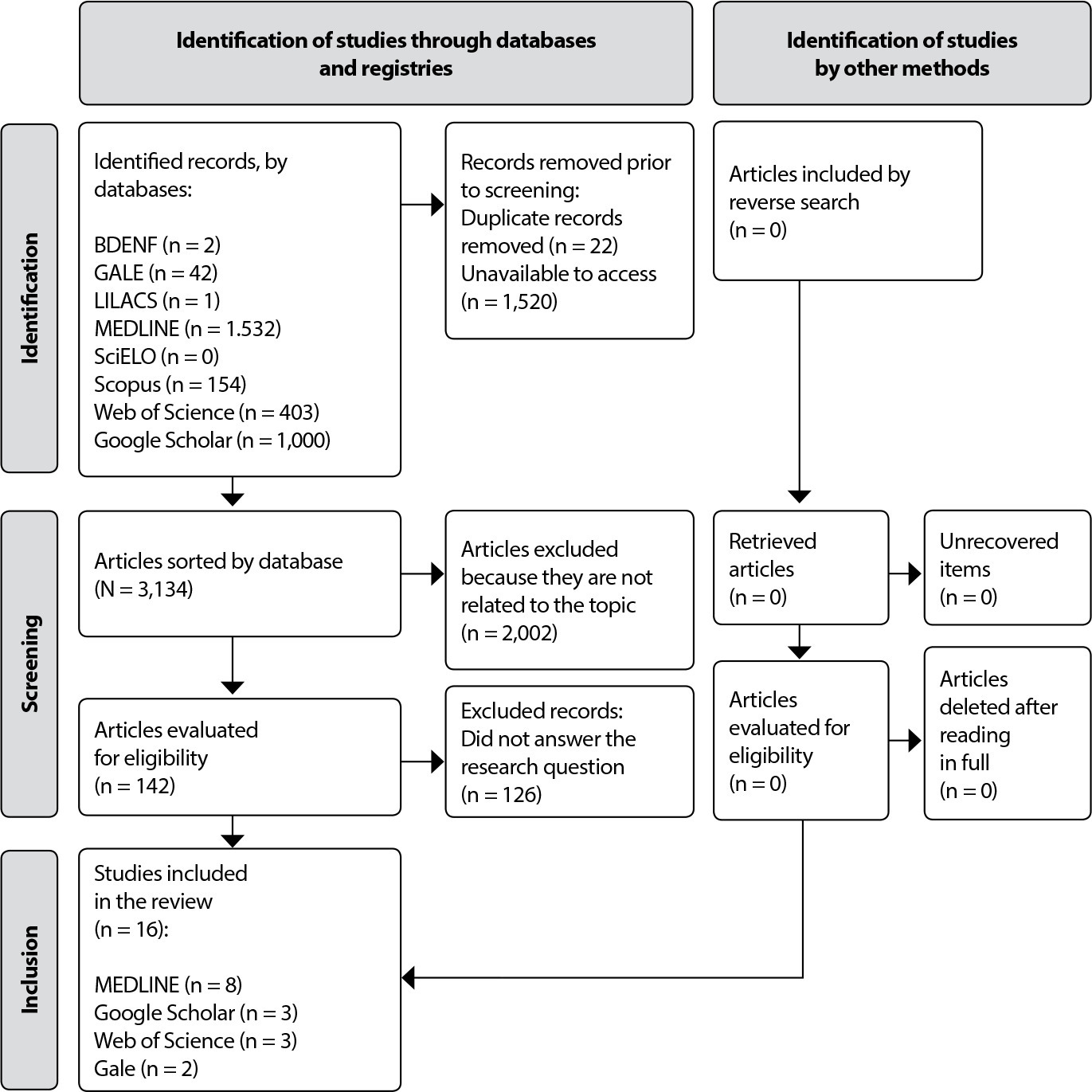
-
ORIGINAL ARTICLE08-07-2023
Workload assessment: cross-cultural adaptation, content validity and instrument reliability
Revista Brasileira de Enfermagem. 2023;76(3):e20220556
Abstract
ORIGINAL ARTICLEWorkload assessment: cross-cultural adaptation, content validity and instrument reliability
Revista Brasileira de Enfermagem. 2023;76(3):e20220556
DOI 10.1590/0034-7167-2022-0556
Views0See moreABSTRACT
Objectives:
to adapt, validate the content and assess the reliability of the instrument National Aeronautics and Space Administration – Task Load Index, translated into Brazilian Portuguese.
Methods:
a methodological study, divided into five steps: translation; synthesis; back-translation; assessment of the Portuguese version by an expert committee; pre-test and content validity of the final version by health professionals working in inpatient units. The Content Validity Index (CVI) (minimum 0.80) and Cronbach’s alpha (minimum 0.70) were calculated.
Results:
in the first round, in the agreement analysis of the translated version, three items did not reach the minimum CVI value. It was decided to remove the statement. The instrument title and items “performance” and “effort” were changed. There was consensus and approval of the final version in the pre-test step.
Conclusions:
the NASA Task Load Index instrument, adapted to Brazilian Portuguese, presents reliability and content validity evidence.
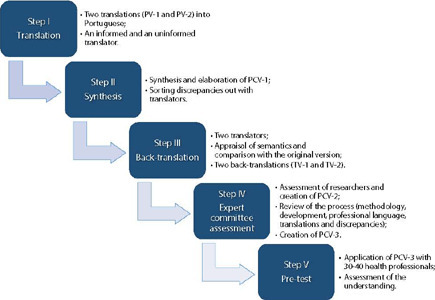
-
REVIEW08-07-2023
Instruments for assessing foot self-care of people with diabetes: a scoping review
Revista Brasileira de Enfermagem. 2023;76(3):e20220555
Abstract
REVIEWInstruments for assessing foot self-care of people with diabetes: a scoping review
Revista Brasileira de Enfermagem. 2023;76(3):e20220555
DOI 10.1590/0034-7167-2022-0555
Views0See moreABSTRACT
Objectives:
to map, in the world literature, instruments for assessing foot self-care of people with diabetes.
Methods:
a scoping review in Scopus by Elsevier, MEDLINE via PubMed, LILACS, SciELO databases and gray literature, using the controlled words diabetic foot, self care, questionnaire. Search was carried out in February and March 2021, according to JBI recommendations and PRISMA-ScR extension.
Results:
fifteen studies made up the review, 14 articles and one thesis, published between 2000 and 2020. 16 instruments were identified: five with an emphasis on general self-care and 11 on foot self-care. Inspection, hygiene, washing and drying between the toes, lotion application and use of proper shoes and socks were the main self-care measures presented.
Final Considerations:
foot self-care is assessed by knowledge, social support and frequency with which measures are being put into practice, encouraging professional practice.
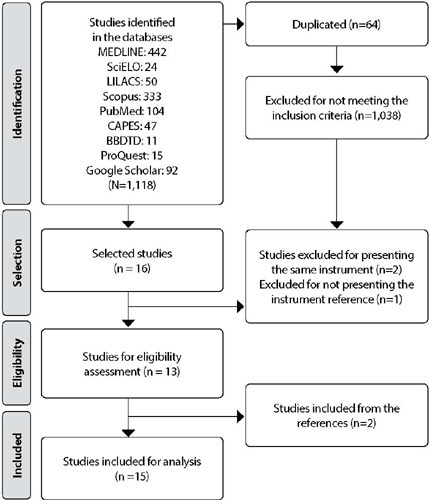
-
ORIGINAL ARTICLE08-07-2023
“Educational Material on HIV”: validity of health educational technology for people living with HIV
Revista Brasileira de Enfermagem. 2023;76(3):e20220549
Abstract
ORIGINAL ARTICLE“Educational Material on HIV”: validity of health educational technology for people living with HIV
Revista Brasileira de Enfermagem. 2023;76(3):e20220549
DOI 10.1590/0034-7167-2022-0549
Views0ABSTRACT
Objectives:
to validate the educational technology “Educational Material on HIV” (INPI – BR 10 2020 003765 0).
Methods:
a methodological study with 39 expert judges in HIV/AIDS, using a 5-point Likert scale for assessment. Data were tabulated, processed and analyzed through descriptive analysis. Cronbach’s alpha and McDonald’s omega tests were performed to analyze internal consistency, and the Intraclass Correlation Coefficient, for reliability. Agreement was established by a Level Content Validity Index greater than 0.90.
Results:
the assessment instrument showed high internal consistency (Cronbach’s alpha of 0.89; McDonald’s omega of 0.91) with reliable values. Based on the Intraclass Correlation Coefficient, judges’ answers showed acceptable reliability, mean score 0.89 (p<0.001). Agreement among judges was greater than 0.90 in the three assessed dimensions (objectives, presentation and relevance).
Conclusions:
the technology was considered a qualified and adequate tool by the judges regarding its objectives, presentation and relevance.
Keywords:Acquired Immunodeficiency SyndromeEducational TechnologyHealth EducationHIVValidation StudySee more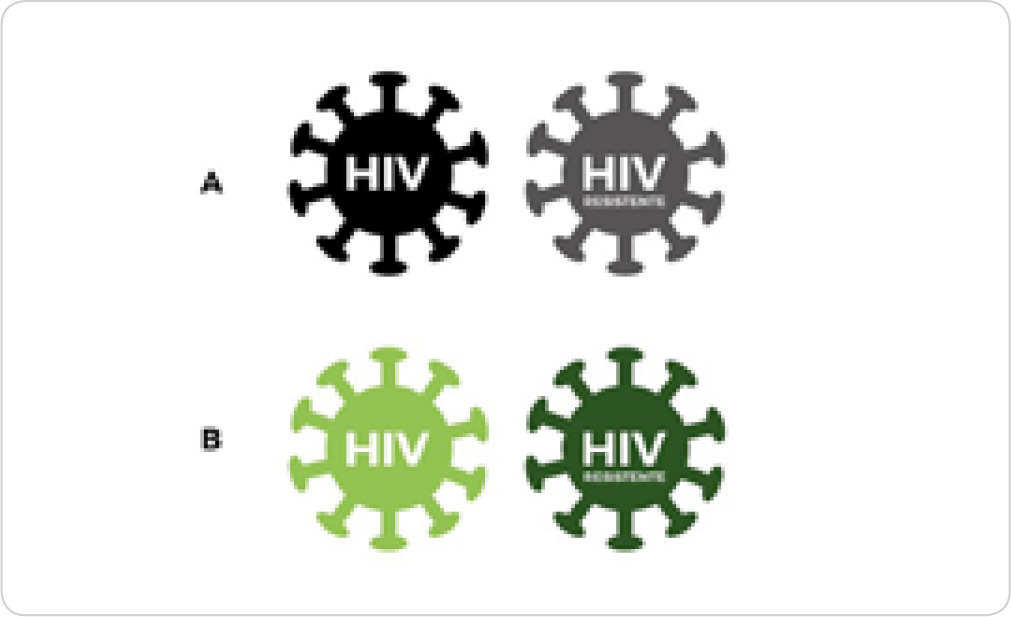
-
ORIGINAL ARTICLE08-07-2023
Content validity of the Post-Stroke Guidance and Follow-up Booklet
Revista Brasileira de Enfermagem. 2023;76(3):e20220532
Abstract
ORIGINAL ARTICLEContent validity of the Post-Stroke Guidance and Follow-up Booklet
Revista Brasileira de Enfermagem. 2023;76(3):e20220532
DOI 10.1590/0034-7167-2022-0532
Views0See moreABSTRACT
Objectives:
to provide sources of content validity evidence for the Post-Stroke Guidance and Follow-up Booklet.
Methods:
a quantitative-qualitative approach, using two Delphi method and content analysis rounds. The Educational Content Validation Instrument in Health was sent to 53 independent judges. A Content Validity Index above 0.90 was considered.
Results:
of the 14 nurses who participated, 64.3% have experience with stroke care, 35.7% with primary care and 64.3% with educational material production. In content analysis, judges’ suggestions were stratified into four categories: material conformation, objectivity, accuracy and perception. Spelling changes were made to the images, addition of functionality scale, adequacy of technical terms and language. The Content Validity Index in the second round showed a concordance of 0.97.
Conclusions:
the booklet presented satisfactory content validity sources of evidence.
-
ORIGINAL ARTICLE08-07-2023
Construction and validity of the Interprofessional Communication in Health Scale
Revista Brasileira de Enfermagem. 2023;76(3):e20220483
Abstract
ORIGINAL ARTICLEConstruction and validity of the Interprofessional Communication in Health Scale
Revista Brasileira de Enfermagem. 2023;76(3):e20220483
DOI 10.1590/0034-7167-2022-0483
Views0See moreABSTRACT
Objectives:
to construct and validate the Interprofessional Communication Scale in Health.
Methods:
a psychometric study was carried out on a sample of 360 nurses from a hospital and university center in central Portugal. Reliability was assessed through internal consistency and construct validity through exploratory and confirmatory factor analysis.
Results:
the Interprofessional Communication in Health Scale, consisting of 27 items, is organized into 3 factors: “Teamwork”, “Conflict management” and “Leadership”, with a total variance of 51.1%. Good internal consistency was obtained, with a Cronbach’s alpha of 0.842, and adequate Goodness of Fit Index model.
Conclusions:
the Interprofessional Communication in Health Scale presents a factorial structure with adequate validity and reliability results, and may constitute a useful self-report instrument in assessing interprofessional communication in health.
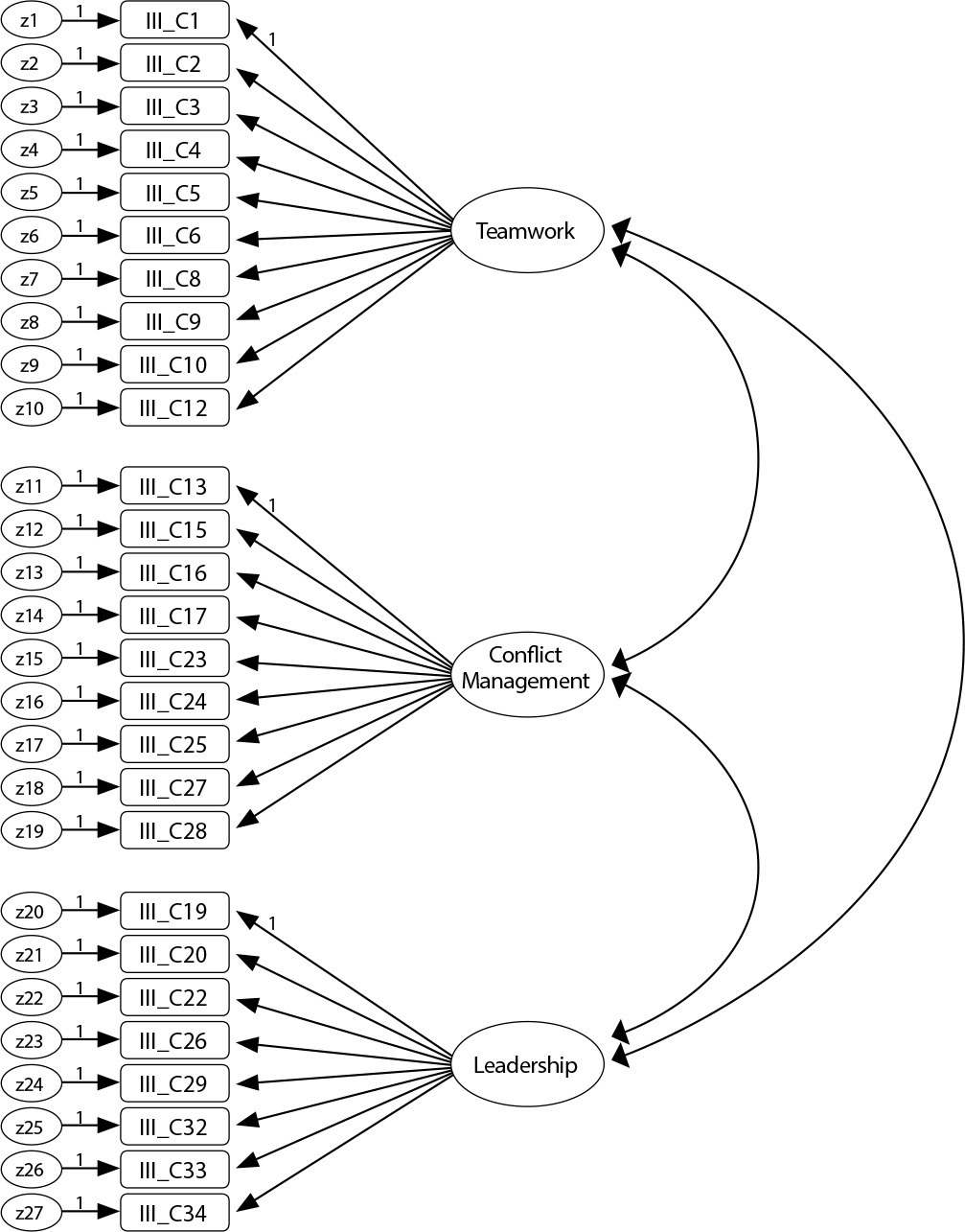
-
ORIGINAL ARTICLE08-07-2023
Systematization of Nursing Care: how did the concept mature?
Revista Brasileira de Enfermagem. 2023;76(3):e20220464
Abstract
ORIGINAL ARTICLESystematization of Nursing Care: how did the concept mature?
Revista Brasileira de Enfermagem. 2023;76(3):e20220464
DOI 10.1590/0034-7167-2022-0464
Views0See moreABSTRACT
Objectives:
to analyze the Systematization of Nursing Care conceptual maturation from the perspective of pragmatic utility.
Methods:
a concept analysis study. The stages were: select the concept; elaborate analytical questions; comprehensively review the literature; and determine concept structural components. Sixty-one documents were analyzed after a search carried out until October 2019.
Results:
four temporal periods of contextual changes have occurred since the emergence of ideas of a systematization in the 1960s. This first lasted until 1990. It was followed by those from 1990 to 2002, from 2002 to 2009 and from 2009 onwards. Partial conceptual maturity was identified, operationalization over the years, based on multiple definitions, and, currently, a concept of Systematization of Nursing Care with managerial and organizational attributes.
Conclusions:
the concept of Systematization of Nursing Care is partially mature, presents multiple definitions, being operationalized in uncertain connections with other concepts.
Search
Search in:
Nuvem de Tags
Aged (144) Atenção Primária à Saúde (239) COVID-19 (104) Cuidados de Enfermagem (269) Educação em Enfermagem (151) Educação em Saúde (139) Enfermagem (930) Estudos de Validação (131) Health Education (144) Idoso (208) Mental Health (149) Nursing (987) Nursing Care (306) Patient Safety (151) Primary Health Care (284) Qualidade de Vida (104) Quality of Life (106) Saúde Mental (145) Segurança do Paciente (150) Validation Studies (108)



